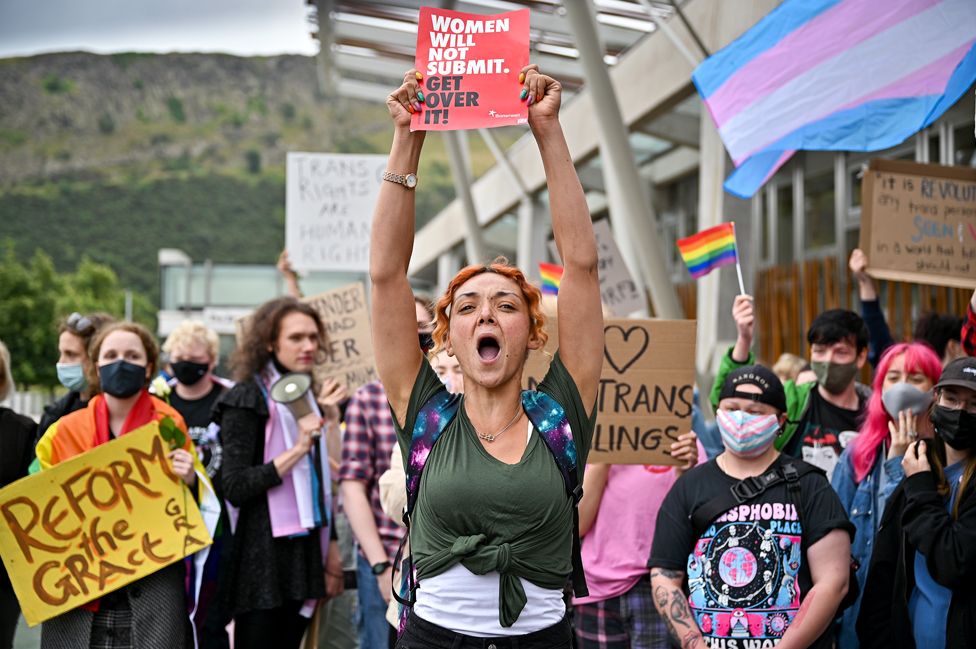How The UK Court's Definition Of "Woman" Could Reshape Sex-Based Rights For Transgender People

Table of Contents
The Court's Definition and its Implications
The core of the court's ruling hinges on a biological definition of "woman," explicitly excluding gender identity. This narrow interpretation prioritizes biological sex assigned at birth, effectively disregarding the lived experiences and legal recognition of transgender individuals. The key aspects of this ruling and its limitations include:
- A focus on biological sex: The court's definition centers solely on biological factors, overlooking the complexities of gender identity and the legal recognition afforded by a Gender Recognition Certificate (GRC).
- Impact on single-sex spaces: This ruling raises concerns regarding access to single-sex spaces UK, such as women's shelters, prisons, and changing facilities. Transgender women risk exclusion from these vital services designed to ensure their safety and well-being.
- Implications for healthcare: Access to gender-affirming healthcare and women's health services may be jeopardized for transgender women, creating significant barriers to accessing appropriate and necessary medical care.
The ruling highlights a crucial distinction between sex and gender. While "sex" typically refers to biological characteristics, "gender" encompasses an individual's internal sense of self. The court's decision primarily focuses on sex, potentially undermining the progress made in recognizing gender identity as a legally relevant factor. This creates further legal challenges for transgender individuals seeking recognition and protection under the law. The ruling's implications for transgender healthcare, in particular, are significant and warrant further scrutiny.
Impact on Access to Services and Protections
The court's narrow definition of "woman" threatens to erode access to services specifically designed for women, leaving transgender women vulnerable and potentially at risk.
- Loss of access to vital services: This includes essential services such as domestic violence shelters, which provide crucial safety and support, and female-only health services, which offer tailored medical care. Exclusion from these services leaves transgender women in precarious situations.
- Implications for sex-based discrimination: Existing anti-discrimination laws are now subject to reinterpretation in light of this ruling. This creates a legal grey area and may limit the protection afforded to transgender individuals against sex-based discrimination.
- Potential legal challenges: The ruling necessitates further legal challenges to ensure the rights and protections of transgender individuals are upheld and that existing equality legislation is applied equitably. Transgender discrimination UK is now a heightened concern that needs immediate attention.
The Future of Gender Recognition Certificates (GRCs)
The process of obtaining a GRC in the UK involves a complex application process, including medical evidence and a declaration of intent to live permanently in the acquired gender. The court's ruling could significantly impact future GRC applications and the government's response.
- Influence on future applications: The ruling may embolden those who oppose self-identification, potentially making the GRC application process more difficult and stringent. This could delay or deny legal recognition for transgender individuals.
- Government response and potential reform: The government may be pressured to review and potentially reform the GRC system, leading to either stricter requirements or a more streamlined, inclusive process. GRC reform is a critical issue arising from this ruling.
- Potential legal challenges to the GRC system: The ruling invites further legal challenges to the existing GRC system, potentially leading to its overhaul or complete replacement with a more inclusive framework. The debate around self-identification and its role in determining legal gender is central to these challenges.
International Comparisons and Best Practices
Comparing the UK's approach to other countries reveals variations in legal frameworks regarding transgender rights. Many European nations have adopted more inclusive policies, recognizing self-identification as a valid basis for legal gender recognition. Examining international human rights frameworks and inclusive policies offers potential models for best practices transgender inclusion in the UK. Learning from countries with more progressive legislation could inform potential reforms and ensure alignment with international standards on human rights.
Conclusion
The UK court's narrow definition of "woman" has significant and potentially detrimental effects on transgender people's access to services, legal protections, and overall equality. The ruling raises serious questions about the interpretation of sex-based rights and necessitates a thorough review of existing legislation. This decision underscores the urgent need for a comprehensive review of the UK's legal framework surrounding transgender rights and the definition of "woman." Continued dialogue, legal challenges, and legislative reform are crucial to ensure the inclusion and protection of transgender individuals in the UK. Understanding the implications of this ruling is a critical first step in advocating for meaningful change in transgender rights in the UK.

Featured Posts
-
 Analyzing The U S Dollars Trajectory Potential For Worst Start Since Nixon Era
Apr 29, 2025
Analyzing The U S Dollars Trajectory Potential For Worst Start Since Nixon Era
Apr 29, 2025 -
 Wrestle Mania Missing Brit Paralympian Found After Four Day Search
Apr 29, 2025
Wrestle Mania Missing Brit Paralympian Found After Four Day Search
Apr 29, 2025 -
 How To Buy Tickets For The Capital Summertime Ball 2025
Apr 29, 2025
How To Buy Tickets For The Capital Summertime Ball 2025
Apr 29, 2025 -
 Tornado And Flooding Emergency Louisville Under State Of Emergency
Apr 29, 2025
Tornado And Flooding Emergency Louisville Under State Of Emergency
Apr 29, 2025 -
 Trumps Potential Pardon For Pete Rose A Look At The Mlb Betting Ban
Apr 29, 2025
Trumps Potential Pardon For Pete Rose A Look At The Mlb Betting Ban
Apr 29, 2025
